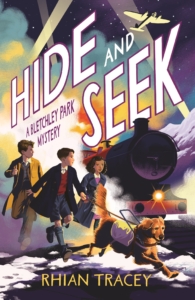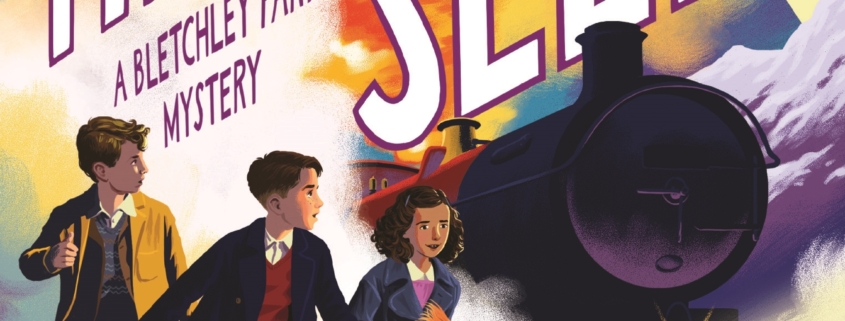Hide and Seek by Rhian Tracey
We have a fascinating glimpse into Rhian Tracey’s quest for telling historical stories, especially ones close to her home and heart.

Lesser known histories and mysteries are my favourite subjects to read, research and write about. I am by nature a curious (even nosy, some might say!) person and find creative pleasure in exploring unanswered questions. The silences and secrets between the pages of a history book are where stories come to life for me. I’ve always lost and found myself by dipping into the gaps and slipping between the cracks in our collective histories, whether of Britain, the world, or, as I have done more recently, closer to home. Learning about my family’s history is how the Bletchley Park Mystery series came about. When my great-aunt, Audrey, let slip in a pub one Sunday lunchtime, that she’d worked at Bletchley Park, I was able to view World War Two, from a personal and domestic perspective. Taking part in this very secret war, which she’d been sworn never to reveal, literally signing a life or death document, meant that we sadly know little about her time there. But the precious stories she did let slip are ones my family treasure. History is often written by those with privilege and power and so it goes without saying that the story of a working-class orphan girl, from Wales, with English as her second language, who’d never left her local area, let alone hopped on a train to take part in war work, is not one which normally gets told. Many minority groups were, and still are, missing from history but with perseverance, and the right platform (thank you Piccadilly Press!), and a passion for oral histories and social histories, these stories, any many more, are beginning to come to light.
After volunteering to be a parent helper on a visit to Bletchley Park, with my daughter and her school group, and I found myself surrounded by untold stories, fingertips and imagination itching to bring them to life. Not long after this trip, fate steered my hand once more when I took my three children to visit Upton House, in Warwickshire, just as something to do during the LONG summer holidays. I had no idea that the first seed for Hide and Seek would be planted, long before I got around to writing I, Spy! During our visit, an exhibition was taking place at Upton about art and what happened to it during the war. Viscount Bearsted, the then owner of Upton, was a trustee of the National Gallery, and well aware of Kenneth Clarke’s (director of the National Gallery) evacuation plans for the country’s priceless artwork. The viscount asked Clarke to take 40 pieces from his own art collection at Upton, to a tiny little place in North Wales, called Manod. Manod quarry had been chosen to secretly house the nation’s treasures, an operation given a firm push and a shove from the prime minister, Winston Churchill, who famously decreed, “Hide them in caves and cellars, but not one picture shall leave this island.”
Naturally, the Blitz weary Londoners were devastated to see their museums and art galleries emptied and highly suspicious about where these magnificent paintings had disappeared to. Strongly worded letters were written and published in the national press and Clarke and the National Gallery realised they had a serious problem on their hands! What if the enemy and their spies hiding in Britain, notoriously the Cambridge Five, worked out where the paintings were being hidden! For all his faults, of which there were many, Kenneth Clarke believed that art was for everybody and with his team, devised the Picture of the Month scheme, dangerously transporting one piece of art from Manod in North Wales, back to the National
Gallery, in London, to be put on display; Noli me Tangere by Titian, was the very first painting that started the ‘Picture of the month’ tradition. The scheme continues to this day, although the art has far less to travel, unlike my protagonist Ned, his frenemy, Harri and the ever faithful, Guide Dog, Kip, who embark on a journey similar to that of my great-aunt, Audrey, travelling from Wales to London, whilst bombs are falling, and spies are lurking on every train platform, all for the greater good and the war effort.




